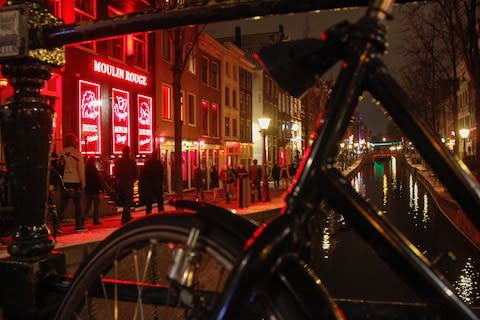Amsterdam bans tours of red light district – but will it deter unruly tourists?

Tours of Amsterdam’s louche Red Light District will be banned next year in a move that councillors claim will improve the working conditions of prostitutes and reduce overcrowding in the historic neighbourhood.
“We are banning tours that take visitors along sex workers’ windows, not only because we want to prevent overcrowding in the red light district, but also because it is not respectful to sex workers,” said city alderman, Udo Kock. “It is outdated to treat sex workers as a tourist attraction.”
The council claims it consulted sex workers in the city and found that 80 per cent of them cited gawking tourists as being bad for business. Critics are skeptical of the consultation because it only questioned 10 sex workers.
Some tour operators have welcomed the new legislation, suggesting it could help locals reclaim their neighbourhood from unruly tourists.
“Residents have a right to a live peacefully in their historic city and not as props in a theme park or extras in a bad stag do movie,” said Justin Francis, CEO of Responsible Travel.

However, others have criticised the ban – due to come into effect on January 1 – claiming it penalises guides who are acting responsibly and will unlimately fail to stop both overcrowding and tourists leering at sex workers.
“There are certain parties that cause trouble in the red light district, but most of the trouble is caused by groups without a guide, like bachelour parties from the UK and Germany,” said Elard Tissot van Patot, founder of Amsterdam Red Light District Tours.
“The people we have on our tours are super respectful to the neighbourhood – they are not the ones that go partying through the neighbourhood at night.”
Bert Nap, whose mezzanine apartment overlooks Achterburgwal canal, agrees. “Something had to be done to diminish the load of visiting public in the red light district,” he told Telegraph Travel. “But banning the guided tours will not lead to less visitors. People will come unguided.”
Under new rules introduced last April, all guides working in the red light district had to apply for a permit from the authorities. They were also prohibited from stopping outside window brothels, gathering in busy areas and having more than 20 individuals on their tours.
The regulations have reportedly reduced the level of disruption in the red light district, where, as of next week, tours will not be permitted after 7pm. Patot claims he is disappointed that an outright ban was announced before the results of the curfew had been assessed.
The ban is the latest in a series of measures aimed at cleaning up the iniquitous red light district, where a reported 40 per cent of window brothels have been forced to close in the last decade. Many of the city's cannabis coffeeshops have also had to shut, as the authorities move to improve the neighbourhood's image.

Such measures don’t seem to be deterring tourists, though, who are descending on Amsterdam in record numbers. Last year, the city of 850,000 residents hosted an estimated 19 million visitors.
“It’s unlivable here at the weekend,” said Nap. “I have a small place in the country and I go there at the weekend just to escape.”
Rodney Bolt, Telegraph Travel’s Amsterdam expert, claims the surge in tourism is “fatally poisoning what attracted people to the city in the first place”.
“Soon only the rich will be able to afford to live in the centre, sharing the space with a transitory population of tourists and short-term lets,” he said. “Amsterdam will be ironed out, homogenized.”
To reduce overcrowding in Amsterdam, the authorities have clipped the wings of Airbnb, banned new hotels from opening in the centre and announced plans to increase the tax on all overnight stays to seven per cent, as of 2019. It is currently six per cent in the city centre and four per cent in other districts.
It is debatable, however, whether such measures will mitigate the impacts of mass tourism in Amsterdam, which is predicted to attract 29 million tourists per year by 2030.

